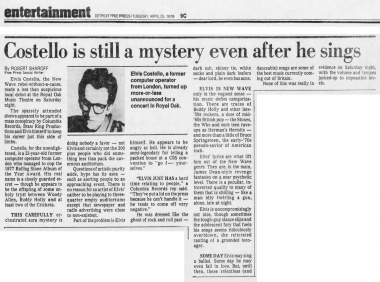Detroit Free Press, April 25, 1978: Difference between revisions
(formatting) |
(formatting) |
||
| (3 intermediate revisions by the same user not shown) | |||
| Line 10: | Line 10: | ||
---- | ---- | ||
{{Bibliography text}} | {{Bibliography text}} | ||
Elvis Costello, the New Wave rebel-without-a-cause, made a less than auspicious local debut at the Royal Oak Music Theatre on Saturday night. | Elvis Costello, the New Wave rebel-without-a-cause, made a less than auspicious local debut at the Royal Oak Music Theatre on Saturday night. | ||
The sparsely attended shows appeared to be part of a mass conspiracy by Columbia Records, Brass Ring Productions and Elvis himself to keep his career just this side of limbo. | The sparsely attended shows appeared to be part of a mass conspiracy by Columbia Records, Brass Ring Productions and Elvis himself to keep his career just this side of limbo. | ||
Costello, for the unenlightened, is a 23-year-old former computer operator from London who managed to cop the 1977 [[Rolling Stone, December 29, 1977|''Rolling Stone'']] Album of the Year Award. His real name is a closely guarded secret though he appears to be the offspring of some unholy tryst between Woody Allen, Buddy Holly and at least two of the Crickets | Costello, for the unenlightened, is a 23-year-old former computer operator from London who managed to cop the 1977 [[Rolling Stone, December 29, 1977|''Rolling Stone'']] Album of the Year Award. His real name is a closely guarded secret — though he appears to be the offspring of some unholy tryst between Woody Allen, Buddy Holly and at least two of the Crickets. | ||
Elvis | This carefully orchestrated aura mystery is doing nobody a favor — not Elvis and certainly not the 300 plus people who did something less than pack the cavernous auditorium. | ||
Questions of artistic purity aside, hype has its uses — such as alerting people to an approaching event. There is no reason for an artist of Elvis' caliber to be playing to three-quarter empty auditoriums except that newspaper and radio advertising were close to non-existent. | |||
Part of the problem is Elvis himself. He appears to be angry as hell. He is already semi-legendary for telling a packed house at a CBS convention to "go | Part of the problem is Elvis himself. He appears to be angry as hell. He is already semi-legendary for telling a packed house at a CBS convention to "go f--- yourselves." | ||
"Elvis just has a hard time relating to people," a Columbia Records rep said. "They've put a lid on the press because he can't handle it — he tends to come off very negative." | "Elvis just has a hard time relating to people," a Columbia Records rep said. "They've put a lid on the press because he can't handle it — he tends to come off very negative." | ||
He was dressed like the ghost of rock and roll past | He was dressed like the ghost of rock and roll past — dark suit, skinny tie, white socks and plain dark loafers — dear lord, he even has acne. | ||
Elvis is New Wave only in the vaguest sense — his music defies categorization. There are traces of Buddy Holly and other late-'50s rockers, a dose of mid-'60s British pop the Stones, the Who and such teen rave-ups as Herman's Hermits and more than a little of Bruce Springsteen, the early-'70s pseudo-savior of American rock. | |||
Elvis' lyrics are what lift him out of the New Wave genre. They are, in the main, James Dean-style revenge fantasies on a near psychotic level. There is a peculiar, introverted quality to many of them that is chilling — like a man idly twirling a gun, alone, late at night. | |||
Elvis is uncompromisingly not nice, though sometimes the tough-guy stance slips and the adolescent fury that fuels his songs seems ridiculously overblown, the reiterated ranting of a grounded teenager. | |||
Some day Elvis may sing a ballad. Some day he may even fall in love. But, until then, these relentless danceable songs are some of the best music currently coming out of Britain. | Some day Elvis may sing a ballad. Some day he may even fall in love. But, until then, these relentless (and danceable) songs are some of the best music currently coming out of Britain. | ||
None of this was really in evidence on Saturday night, with the volume and tempos jacked-up to impossible levels. | None of this was really in evidence on Saturday night, with the volume and tempos jacked-up to impossible levels. | ||
| Line 36: | Line 41: | ||
{{Bibliography notes}} | {{Bibliography notes}} | ||
{{Bibliography next | |||
|prev = Detroit Free Press, December 18, 1977 | |||
|next = Detroit Free Press, April 27, 1978 | |||
}} | |||
'''Detroit Free Press, April 25, 1978 | '''Detroit Free Press, April 25, 1978 | ||
---- | ---- | ||
[[Robert Sharoff]] | [[Robert Sharoff]] profiles Elvis Costello and reports on his concerts with [[The Attractions]], Saturday, [[Concert 1978-04-22 Royal Oak (early)|April 22, 1978]], Royal Oak Music Theatre, Royal Oak, Michigan. | ||
{{Bibliography images}} | {{Bibliography images}} | ||
[[image:1978-04-25 Detroit Free Press page 9C clipping 02.jpg|380px]] | |||
<br><small>Clipping.</small> | |||
<small>Page scan.</small><br> | |||
[[image:1978-04-25 Detroit Free Press page 9C.jpg|x120px|border]] | [[image:1978-04-25 Detroit Free Press page 9C.jpg|x120px|border]] | ||
{{Bibliography notes footer}} | {{Bibliography notes footer}} | ||
| Line 52: | Line 64: | ||
*[http://www.freep.com/ Freep.com] | *[http://www.freep.com/ Freep.com] | ||
*[http://en.wikipedia.org/wiki/Detroit_Free_Press Wikipedia: Detroit Free Press] | *[http://en.wikipedia.org/wiki/Detroit_Free_Press Wikipedia: Detroit Free Press] | ||
<!-- | <!-- 98575775 --> | ||
--> | |||
{{DEFAULTSORT:Detroit Free Press 1978-04-25}} | {{DEFAULTSORT:Detroit Free Press 1978-04-25}} | ||
Latest revision as of 08:53, 20 February 2020
|

